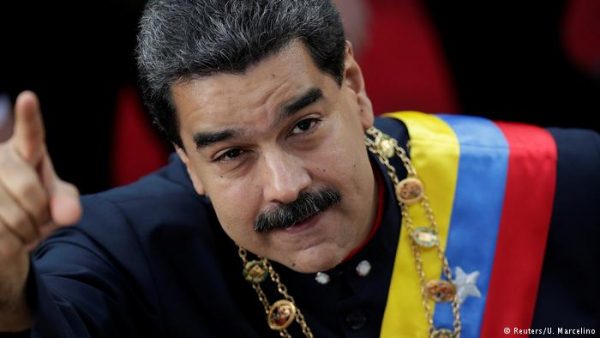 President Nicolas Maduro celebrated the start to a second term as Venezuela’s leader Thursday, but his world got smaller as countries seized upon the inauguration to cut back diplomatic ties, reject his legitimacy and label him a dictator.
President Nicolas Maduro celebrated the start to a second term as Venezuela’s leader Thursday, but his world got smaller as countries seized upon the inauguration to cut back diplomatic ties, reject his legitimacy and label him a dictator.
Once among Latin America’s wealthiest countries, Venezuela is enduring a historic crisis following two decades of socialist rule, with residents struggling to afford basic goods as inflation soars, driving mass migration.
Maduro’s second six-year term extends the country’s socialist revolution amid widespread complaints that he has stripped the country of its last vestiges of democracy.
Seventeen Latin American countries, the United States and Canada denounced Maduro’s government as illegitimate in a measure adopted Thursday.
Maduro rejected the accusation, vowing to continue the legacy of the late President Hugo Chavez and accused the United States of trying to ignite unrest through its increasing economic sanctions.
“Venezuela is the center of a world war led by the North American imperialists and its allies,” he declared in a speech after his swearing-in. “They have tried to convert a normal inauguration into a world war.”
Maduro, a 56-year-old former bus driver and Chavez’s hand-picked successor, took the helm of government after narrowly winning election following Chavez’s 2013 death. He denies being a dictator and often accuses President Donald Trump of leading an economic war against Venezuela that is destroying the country.
In May, Maduro declared victory following an election that his political opponents and many foreign nations consider illegitimate because popular opponents were banned from running and the largest anti-government parties boycotted the race.
On Thursday, the Organization of American States voted not to recognize the legitimacy of Maduro’s second term, adopting a resolution presented by Colombia, Argentina, Brazil, Chile, Costa Rica, the United States, Paraguay and Peru. Venezuela’s ambassador to the OAS, Samuel Moncada, denounced the move as “a hostile act … against the will of our nation.”
Paraguay went a step further, severing diplomatic ties. Peru also called home its top diplomat from Caracas in protest and banned 100 members of Maduro’s administration from entering the country. Argentina suspended Venezuelan diplomatic and official passports for banned high-ranking members of Maduro’s administration from entering.
U.S. Secretary of State Mike Pompeo said in a statement that the United States would keep up pressure in support of the Venezuelan people.
“It is time for Venezuelan leaders to make a choice,” Pompeo said. “Now is the time to convince the Maduro dictatorship that the moment has arrived for democracy to return to Venezuela.”
Argentine President Mauricio Macri also denounced Maduro, saying he lacks the authenticity won through honest elections despite the elaborate inauguration ceremony.
“Nicolas Maduro today is making a mockery of democracy,” Macri said on Twitter. “Venezuelans know it, the world knows it. Venezuela lives under a dictatorship.”
Most countries from Europe and Latin American didn’t send representatives to the swearing-in.
Presidents Miguel Diaz-Canel of Cuba, Evo Morales of Bolivia and Anatoli Bibilov of a breakaway province of Georgia were among the few foreign leaders who attended the ceremony at the country’s Supreme Court.
Venezuela, which sits atop the world’s largest oil reserves, produced 3.5 million barrels of crude daily when Chavez took power. Output has plummeted to less than a third of that. Critics blame years of rampant corruption and mismanagement of the state-run oil company PDVSA.
The economic collapse has thrown the nation of 30 million people into turmoil.
The economy in 2019 will continue to contract and inflation will skyrocket at a staggering 23 million percent, forecasts Francisco Rodriguez, a former Venezuelan official who is now chief economist at New York-based Torino Capital.
An estimated 2.3 million Venezuelans have fled, according to the United Nations. Those remaining live on a monthly minimum wage equal to less than $5 and falling daily.
Venezuela’s splintered opposition movement has failed to counter the socialist party’s dominance as Maduro’s government has jailed or driven into exile its most popular leaders.
The opposition-led Congress opened its session for the year, led by 35-year-old Juan Guaido, who accused Maduro of “usurping the presidency.”
“Today there is no head of state. Today there is no commander-in-chief,” Guaido said.
The Trump administration has increased pressure on Maduro through financial sanctions, targeting dozens in Maduro’s government. U.S. banks are also banned from doing business with Venezuela, putting a financial strangle-hold on the cash-strapped country.
David Smilde, a Tulane University professor and expert on Venezuela, said that sanctions aren’t likely to create change. Ultimately, Maduro’s government isn’t worried about its international reputation, he said.
“He still has control of the institutions,” Smilde said. “He has the guns. He has the money.”
While Maduro’s popularity has plunged amid scarcities, hyperinflation and rising authoritarianism that have sparked a mass emigration, supporters who receive government subsidies in shantytowns continue to back him.
“It’s not the president’s fault,” said Frances Velazquez, a 43-year-old mother of two who survives with the help of government-subsidized boxes of rice, flour and cooking oil. Velazquez blamed opportunists who drive up the prices of scarce items for making life difficult for families like hers.
Others, like 52-year-old construction worker Ramon Bermudez, have lost hope of escaping Maduro’s rule.
He pointed out the irony of living in a nation with the world’s most abundant oil reserves yet having to wait in line overnight to fill three small canisters of natural gas to cook at home.
“All that’s left to do is raise your hand to heaven and ask God to help us,” said Bermudez, camped out on a Caracas sidewalk with hundreds of others waiting for gas. “There’s nothing more.”
Associated Press

Leave a Reply
You must be logged in to post a comment.